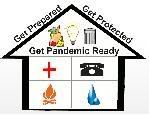# 2891
An interesting article this morning in the magazine Governing, entitled Run For Your Lives, Please by Amanda Ripley, author of The Unthinkable: Who Survives When Disaster Strikes — and Why." She can be reached at www.AmandaRipley.com.
A Hat tip to Charlie_Edwards on Twitter for alerting me to this article.
Last September we watched for nearly a week as Hurricane Ike lumbered towards the Texas Gulf Coast. Although only a category 2 story, hurricane categories only reflect the maximum winds - and that is but one measure of a storm's destructive power.
Ike was a large, slow moving storm, and forecasters knew it would be pushing a large volume of water ahead of it. Some areas, they feared, could see a tremendous surge tide.

Six days prior to landfall, the NHC (National Hurricane Center) was warning that the Texas/Louisiana coast was a prime target. Hurricane warnings went up along the Texas coast a full 72-hours before Ike struck.
Despite early warnings, evacuations of the barrier islands were slow to take place. The local National Weather Service office - fearing a human tragedy was about to unfold - issued a stark warning.
"Persons not heeding evacuation orders," the statement said, "will face certain death."
Cable news outlets picked up on this wording (the same as was used just prior to Hurricane Katrina's landfall in New Orleans in 2005), and evacuations increased significantly.
Still, 74 Texans died and more than 3,000 required rescuing after the storm. When you see the damage left behind, it is easy to understand why.

Remnants of Crystal Beach After Ike
While this unorthodox warning may have motivated additional people to evacuate, many experts have mixed feelings about using that sort of language in emergency warnings to the public.
Finding ways to motivate people to evacuate in the face of danger- or to prepare for a threat before it becomes imminent - has always been difficult.
Every year the news media in Florida reminds the public to prepare for Hurricane season, yet surprisingly few bother until a storm is on the horizon.
Getting people to heed the advice to prepare for a possible pandemic on the HHS's Pandemic Flu Website has faced similar ambivalence. We have agencies like READY.GOV whose entire focus is to get Americans to prepare for disasters.
But all too often, that advice is ignored.
In the following article Amanda Ripley explores the problems inherent in motivating people to act in advance of a disaster, such as a hurricane.
Follow the link to read it in its entirety.
Run for Your Lives, Please
March 2009 By AMANDA RIPLEY
What does it take to make people heed a disaster warning?
On September 13, 2008, Hurricane Ike was hurtling toward Galveston. Water was expected to rise 12 to 16 feet on the Texas island. The incoming surge would inundate communities. Swing sets and homes would vanish under the muck.
Despite the predictions, people did not seem to be packing up their cars and fleeing the island in droves. Then a forecaster in the local National Weather Service office issued a warning that had been used only once before — just before Hurricane Katrina made landfall. "Persons not heeding evacuation orders," the statement said, "will face certain death."
The "certain death" message got picked up by CNN and was broadcast to homes on Galveston, all along the Gulf Coast and to the rest of America. "By getting media attention" says Gene Hafele, the meteorologist in charge of the Houston-Galveston National Weather Service office, "we got the locals' attention."
About 60 to 70 percent of the people in the mandatory evacuation zone left for safer ground — according to Hafele's best estimate. Nobody knows the number for sure. They do know that 74 Texans died and more than 3,500 had to be rescued.
From decades of research into catastrophes — hurricanes, fires, nuclear accidents — disaster specialists have come to realize that people follow patterns in evacuations. Some don't evacuate because they cannot. They have nowhere to go or no way to get there. This is generally a relatively small number of people, although it can be bigger in places with high poverty rates. That was the case in New Orleans when Katrina bore down on the city.
And since the key to getting a message across is supposedly repetition, a small reminder:
A pandemic, or an earthquake, or a flood, or a tornado can occur at just about anytime, with little or no advance warning, it just makes sense to get prepared, and to stay prepared.
Some links to get you started include:
FEMA http://www.fema.gov/index.shtm
READY.GOV http://www.ready.gov/
AMERICAN RED CROSS http://www.redcross.org/
For Pandemic Preparedness Information:
For more in-depth emergency preparedness information I can think of no better resource than GetPandemicReady.Org. Admittedly, as a minor contributor to that site, I'm a little biased.
Related Post:
Widget by [ Iptek-4u ]
